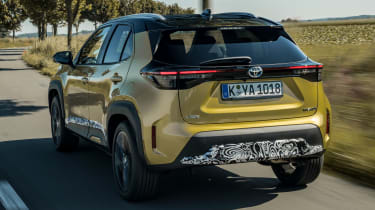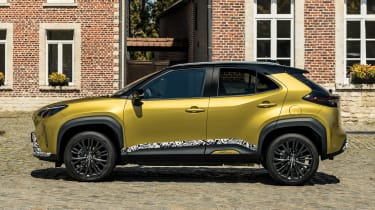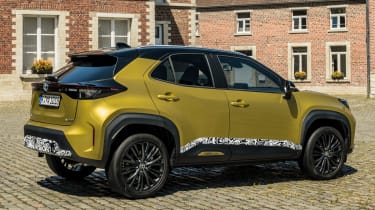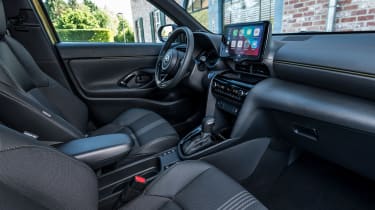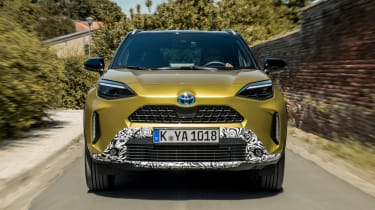New Toyota Yaris Cross SUV prototype drive
The new Toyota Yaris Cross has a hybrid powertrain and four-wheel drive - and we’ve driven an early development car
- New SUV is underpinned by the same platform as the new Yaris
- Features a hybrid powertrain with both front- and four-wheel-drive models
- Prices start from £22,515 with five trim levels available
Pricing and specifications for the new Toyota Yaris Cross hybrid have been confirmed. The new car is Toyota’s smallest SUV to date, sitting beneath the C-HR in the brand’s lineup. It’s available to order now with a price tag of £22,515.
The Yaris Cross is the brand’s newest SUV,and uses the same platform as the Yaris hatchback. It has a hybrid powertrain and a choice of front or four-wheel drive. Buyers will be able to pick from five trim levels, including a range-topping Premiere edition.When it launches, the Yaris Cross will go head to head with the Nissan Juke, Skoda Kamiq, Renault Captur and Ford Puma.
We’ve driven a prototype to see how the car is shaping up before it enters full production.
2021 Toyota Yaris Cross: engines, performance and economy
At launch, the Yaris Cross will only be available as a hybrid, with a three-cylinder 1.5-litre petrol engine and electric motor combining to produce 114bhp. Both front and four-wheel-drive versions will be available, and the system can send power to the wheels via a CVT gearbox or use some of it to charge the battery to provide some electric-only range.
Toyota claims the front-wheel-drive model returns fuel economy of up to 65.7mpg and CO2 emissions of 103g/km.
Toyota has yet to reveal official fuel economy numbers for the four-wheel drive version, only confirming that it emits 107g/km of CO2.
Toyota has not confirmed details of any other engine options but has previously revealed that the Yaris hatchback will be available with a non-hybrid 1.5-litre petrol engine and a manual gearbox in certain European countries, meaning the Yaris Cross could also get this powertrain in the future.
Trim levels and specs
The entry-level Toyota Yaris Cross, known as the Icon, sits on 16-inch alloy wheels and features automatic lights, keyless entry and a reversing camera. The cabin, meanwhile, is equipped with automatic air conditioning, an eight-inch infotainment system with Apple CarPlay and Android Auto, and a two-inch display for the gauge cluster.
The Design model is priced from £24,140 and adds features such as LED projector headlights, rear privacy glass, aluminium roof rails and 17-inch alloy wheels. The styling upgrades continue inside with light blue ambient lighting and black headlining. The Design trim also adds a larger, seven-inch digital gauge cluster.
The mid-range Excel model starts from £26,745 and has dark grey 18-inch alloy wheels, automatic-folding door mirrors, a power-operated tailgate, intelligent parking sensors and an automatic braking system. Buyers also get dual-zone automatic air-conditioning, heated front seats and a heated steering wheel, power lumbar adjustment for the driver’s seat and an auto-dimming rear-view mirror. The Excel also comes with a nine-inch infotainment system.
The next step up from the Excel is the Yaris Cross Dynamic, which starts from £26,465. Upgrades include a more rugged-looking bodykit with front and rear skid-plates, silver roof rails and two-tone paint finish with a contrasting black roof. Buyers can choose to add Toyota’s intelligent all-wheel drive system, which will bump the price to £28,825.
The Premiere Edition is at the top of the Yaris Cross range and is priced from £28,185. It rides on model-specific 18-inch, 10-spoke alloy wheels while the interior is finished in black leather upholstery. It also gets an eight-speaker JBL stereo system and a 10-inch head-up display. Like the Dynamic model, for an extra £2,360, buyers can also opt for all-wheel drive.
Styling and design
While the new crossover shares its name with the Yaris, it gets a look of its own. The Yaris Cross borrows design cues from the larger Toyota RAV4. The front of the car features a flat-front design with swept-back headlights and two large air intakes. The sides of the car feature black plastic body cladding and squared-off wheel arches. At the rear, the Yaris Cross features a sharply angled C-pillar, with wrap around tail lights that merge across the rear hatch.
Lance Scott, design manager at Toyota’s European Design Development studio, told our sister magazine, Auto Express: “Clearly, we want the car to be immediately perceived as a SUV, so we emphasised a higher ground clearance, a strong horizontal axis giving a great balance and poise, big squared wheel arches and of course big wheels.”
Overall the car sits 30mm higher than the Yaris hatchback, and features the same wheelbase (the distance between the front and rear wheels), but is 240mm longer. The roofline has also been raised by 90mm, meaning it offers more interior and luggage space than the Yaris hatchback. Despite being 200mm shorter than the C-HR, Toyota claims that the Yaris Cross is more spacious inside.
Interior and practicality
The interior of the Yaris Cross has been lifted wholesale from the latest Yaris hatchback, with a large dashboard-mounted infotainment touchscreen featuring both Apple CarPlay and Android Auto connectivity. A traditional analogue dial setup also features, along with a digital head-up display. There’s also a new steering wheel and a storage bin in the centre console.
The Yaris Cross has 360 litres of boot space up to the parcel shelf or 460 litres if measured to the ceiling. It also has a number of practical features, including an adjustable boot floor and underfloor storage. Toyota’s Belt Flex system for securing items will be available too.
2021 Toyota Yaris Cross prototype drive by John Mcllroy
Toyota is often credited for driving the popularity of hybrids and SUVs in the UK, with models like the Prius and RAV4 proving a huge hit with buyers. For 2021, Toyota has decided to enter the small SUV market with the new Yaris Cross, a small crossover that combines a frugal hybrid powertrain with a raised ride height and tougher bodywork. It’s Toyota’s first entry into this class, directly rivalling models like the Ford Puma, Renault Captur and Nissan Juke.
Our test car is a front-wheel-drive prototype, which is badged as an ‘Adventure’ spec. It’s the equivalent of the Dynamic trim in the UK and on first impressions, it's obvious the Yaris is a solid foundation for Toyota’s smallest SUV to date.
On the road, the steering is direct and nicely weighted, giving it a positive feel as you turn in. The chassis setup is well balanced, with a decent amount of resistance to body lean in corners and a compliant ride on most road surfaces at higher speeds. Around town, the ride quality suffered slightly due to the large 18-inch alloy wheels fitted to our test car but no more so than its nearest rivals. A small amount of thrum from the three-cylinder engine is noticeable on the move, becoming more muted once up to speed.
The latest version of Toyota’s small-hybrid powertrain is a capable performer, with 0-62mph taking a respectable 11.2. Under hard acceleration, the engine has ample power to get you up to speed but is slightly held back by the e-CVT gearbox, which sends the revs soaring when you press hard on the accelerator.
An area in which the powertrain does excel is efficiency. During our test drive, which was on a mixture of urban A and B roads and some motorway driving, the powertrain was running on pure-electric power for 66% of the journey. With more town driving, this figure could be improved further still, meaning that the Yaris Cross is likely to return fuel economy close to its official figure of 65.7mpg.
Inside, the Toyota has given the Yaris Cross a more upmarket feel than the regular Yaris hatchback, with soft-touch materials covering most of the surfaces. As you’d expect, everything feels very solidly made with a logical layout. Our car was fitted with the larger version of the infotainment screen, which features a very clear and easy to read display.
Verdict
While the Yaris Cross won’t challenge rivals for driving dynamics or practicality, it’s a very strong entry into the packed small SUV sector. Its rugged design gives it plenty of appeal, as does Toyota’s strong reputation for build quality. Combine these elements with the smartly laid-out interior and the efficiency of the hybrid powertrain, and the Yaris Cross has all the makings of a great small family car.
What it means for car buyers
The popularity of small SUVs continues to grow in the UK but despite the introduction of a number of excellent conventional petrol models, such as the Skoda Kamiq, Ford Puma and Renault Captur, consumers currently don’t have a great deal of choice when it comes to low-emission hybrid versions. As buyer demand for greener cars increases, the introduction of the Yaris Cross, along with hybrid versions of the Captur, Panda and Puma, means that buyers who have previously been put off by the high price of larger low-emission SUVs have an excellent range of less expensive options to choose from.
If you want to know more about the best hybrid SUVs to buy in 2021, read our top ten picks here.
Recommended
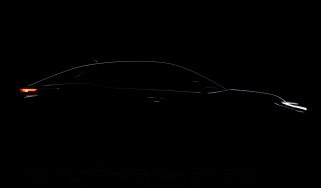
New Toyota electric SUV teased with “stylish coupe design”
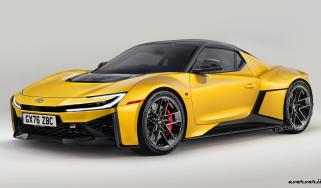
New Toyota MR2 sports car on the way – and it’s not electric!
Most Popular

New Smart #5 Brabus is a 637bhp far cry from the brand’s city car past

Best car leasing deals 2025: this week’s top PCH offers
Tips & advice

Car dashboard warning lights: what does each symbol mean?

Electric car charging stations: public networks, charger types, apps and maps




